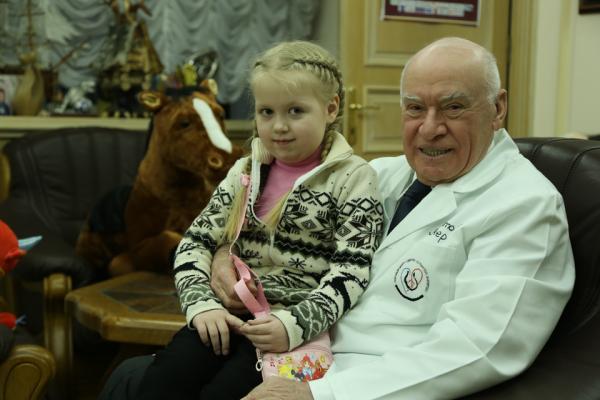
The first Xeltis feasibility study patient, Dominika Zhurkina, visits with Leo Bockeria, M.D., during her three-month follow-up exam at the Bakoulev Center for Cardiovascular Surgery of the Russian Academy of Medical Sciences in Moscow. Photo courtesy Xeltis.
April 23, 2014 — Xeltis announced it finished enrollment in a five-patient feasibility study of implantable products intended to enable for the first time the spontaneous growth of natural, healthy heart valves and vessels. With its proprietary technology, the company has engineered an entirely new therapeutic category called endogenous tissue growth, or ETG, in which surgeons use unique implants designed to allow the body to repair itself by growing natural, healthy tissue.
Xeltis’ first-in-human feasibility study, led by Leo Bockeria, M.D., at the Bakoulev Center for Cardiovascular Surgery of the Russian Academy of Medical Sciences in Moscow, is focused on the implantation of a connecting tube, or conduit, designed to treat children born with single-ventricle heart physiology. Early study follow-up indicates that the investigational treatment has the potential to be a one-time, definitive treatment for these pediatric patients, who under the current standard of care must undergo multiple dangerous surgeries as they age and often need medication throughout their lifetimes. Xeltis chose the Bakoulev Center for its study because it is one of the largest and most experienced hospitals in the world for the treatment of complex congenital heart diseases in children.
“The Xeltis technology is very exciting because it holds the promise to enable ETG for the first time,” said Bockeria. “If proven valid, this therapy will finally end the tragic cycle of repeat surgery and lifelong medication that these children and their families must currently endure. This will not only alleviate pain and suffering for families, it will save billions of healthcare dollars each year.”
ETG is the process of natural tissue growth from within the body, without the use of external stem cells or animal-derived products. Because the tissue produced through ETG is the patient’s own, the treatment has the potential to overcome the limitations of the current standard of care. No foreign material is permanently implanted in the body, so long-term medication may no longer be needed. In addition, the risk of repeated surgeries may be reduced.
“The completion of study enrollment and the very positive early clinical follow-up marks a significant milestone for Xeltis and the new and emerging field of ETG,” said Laurent Grandidier, CEO of Xeltis. “If the results prove our technology feasible, we will be one important step closer to realizing our vision of making it possible for these children to be treated with only one surgery in their lifetimes.”
For more information: www.xeltis.com


 January 05, 2026
January 05, 2026 









